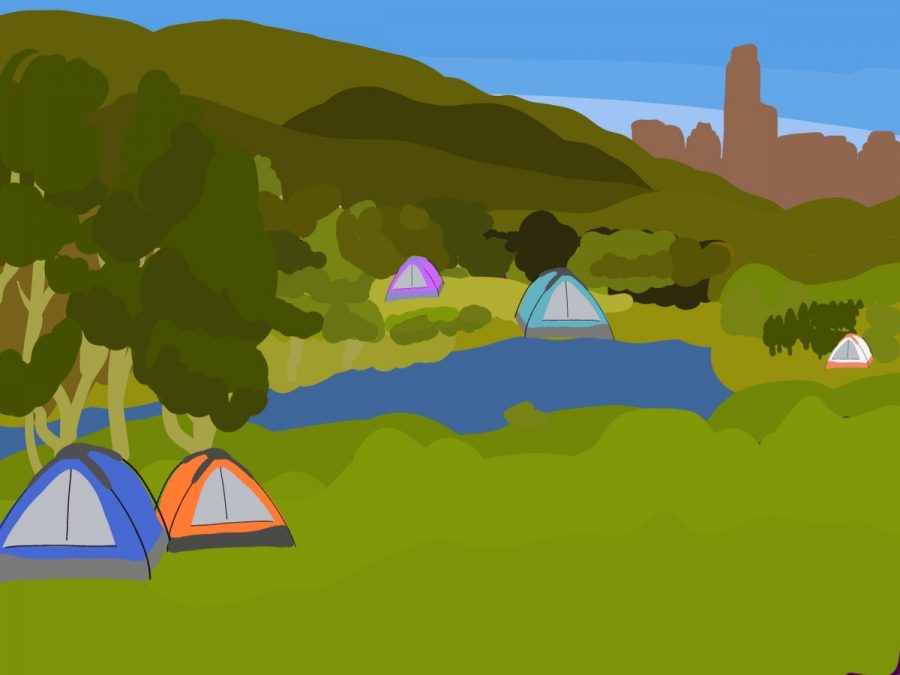Vote ‘no’ on Proposition B
April 20, 2021
Austin has a special election this spring. The ballot contains eight propositions that include measures such as ranked-choice voting and police oversight. Early voting runs April 19-27, and election day is May 1.
Proposition B is gaining notable attention from the community. This proposition would ban camping and panhandling citywide. Additionally, it would prohibit sitting or lying down on a public sidewalk or sleeping outdoors in areas near and around downtown Austin and the UT campus, reversing the 2019 ordinance that decriminalized such actions.
Basically, the proposition would criminalize people experiencing homelessness for not having stable housing.
Proposition B is inhumane, ineffective and does not make anyone safer. This proposition does not address actual solutions that would help the unhoused population, such as housing or social services. It only pushes this community into dangerous situations, including jail.
I urge the UT community to vote against Proposition B. The notion that this proposition would make UT, or anyone else, safer is false. The UT community has a responsibility to protect everyone in it, including those experiencing homelessness.
Organizations at UT are also urging their fellow students and the campus community to vote against Proposition B. University Democrats, Young Democratic Socialists of America at UT Austin, Texas Rising and Students Against Prop B are all taking action against this proposition in different ways, such as canvassing, phonebanking, tabling on campus and more.
In contrast, SafeHorns, a group whose said goal is to “(improve) safety for The University of Texas at Austin students, faculty, staff, and visitors on and around campus through on-going advocacy, strategic planning, and implementation,” has been working with Save Austin Now in support of Proposition B.
Bennett Burke, co-chair of the Young Democratic Socialists of America at UT’s steering committee, argued that SafeHorns is using the notion of student safety to justify the criminalization and harm of unhoused people.
“I want students to show in large numbers that (SafeHorns) does not speak for us and that criminalizing homelessness will not make students any safer,” Burke said.
This idea is echoed by Ric Galvan, Texas Rising’s Central Texas campus organizer, who said that the way to promote safety is not through criminalization of homelessness but through tangible solutions.
“I think that if you want to really invest in public safety, we have to go to the root of what we see as ‘crime’ or whatever, and that is people having a lack of resources that they need,” Galvan said.
Not only is Proposition B morally inexcusable, it is ineffective.
Brandon Bradley, president of University Democrats, argues that statistically, cities with anti-camping ordinances do not lower the rate of homelessness.
“If you think about it for a moment, how could (anti-camping ordinances) reduce the number of people that are living on the streets unhoused?” Bradley said. “What about putting someone in jail or moving them around the city is going to get them off the streets?”
Austin City Council has already approved the purchasing of a hotel to house a number of unhoused people in the city. Homes Not Handcuffs has also been organizing for a housing-first approach to address homelessness.
These are steps in the right direction that provide concrete solutions to reduce the number of unhoused people. Proposition B would do the opposite.
As students and members of the UT community, we have a responsibility to take care of our neighbors. Voting for Proposition B won’t eradicate homelessness. It will just make it less visible. It won’t make the UT community safer. It will only criminalize those in it.
Make your voice heard this election and vote “no” on Proposition B –– people’s lives depend on it.
Cardone is a government and social work sophomore from San Antonio, Texas.











